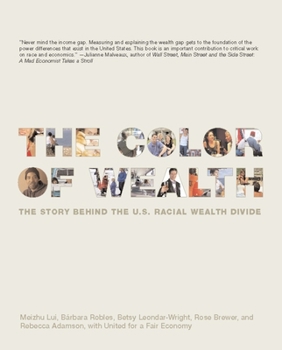The Color of Wealth: The Story Behind the U.S. Racial Wealth Divide
Select Format
Select Condition 
Book Overview
For every dollar owned by the average white family in the United States, the average family of color has less than a dime. Why do people of color have so little wealth? The Color of Wealth lays bare a dirty secret: for centuries, people of color have been barred by laws and by discrimination from participating in government wealth-building programs that benefit white Americans. This accessible book--published in conjunction with one of the country's leading economics education organizations--makes the case that until government policy tackles disparities in wealth, not just income, the United States will never have racial or economic justice. Written by five leading experts on the racial wealth divide who recount the asset-building histories of Native Americans, Latinos, African Americans, Asian Americans, and European Americans, this book is a uniquely comprehensive multicultural history of American wealth. With its focus on public policies--how, for example, many post-World War II GI Bill programs helped whites only-- The Color of Wealth is the first book to demonstrate the decisive influence of government on Americans' net worth. The authors are all part of United for a Fair Economy, a national nonpartisan organization based in Boston, Massachusetts, that campaigns against growing income--and wealth inequality and inspires action to reduce economic inequality.
Format:Paperback
Language:English
ISBN:1595580042
ISBN13:9781595580047
Release Date:June 2006
Publisher:New Press
Length:338 Pages
Weight:1.52 lbs.
Dimensions:0.9" x 7.5" x 9.2"
Customer Reviews
3 ratings
Eyeopening Book
Published by Thriftbooks.com User , 15 years ago
Great book to learn the other side of American History! Needs to be taught in school.
Accessible, clear, enlightening
Published by Thriftbooks.com User , 19 years ago
Heavily researched, but written in a very accessible way. You will learn volumes about wealth disparities and how they got that way, and you will learn something about yourself too. Highly recommended for anyone with interests in social and economic justice, racism, and just getting ahead in America.
Breaking the Seemingly Impenetrable Racial Barriers of Wealth Accumulation
Published by Thriftbooks.com User , 19 years ago
Eye-opening doesn't even begin to describe this enlightening volume about the socioeconomic divide among whites and non-whites in this country and the role the government plays in reinforcing the separation. Organized by five key members of the nonpartisan United for a Fair Economy organization based in Atlanta, the book handily dismantles the Horatio Alger myth, especially for minority members, by detailing how economic predation has persisted even as significant strides have been made in the far more discernible civil rights arena. The co-authors - Executive Director Meizhu Lui, Communications Director Betsy Leondar-Wright, current board member Bárbara Robles, past board member (until 2005) Rose Brewer, and Rebecca Adamson of the First Peoples Worldwide - have assembled not only a comprehensive history but also a fulsome, current picture of the economic discrimination that has festered pointedly against four different groups - African Americans, Asian Americans, Latinos and Native Americans. Not coincidentally, the five women come from five different ethnic groups (including white), which allow them to compare their individual experiences and provide personal validation (and sometimes challenges) of their findings. Perhaps the most compelling fact unearthed is the substantial divide in net worth between blacks and whites. Previously, focus has been mostly on income disparity, which while significant, has been almost passively accepted. Specifically, median household income for whites in 2003 was about $48K, while for black households it was about $30K. However, looking on the balance sheet, the co-authors uncovered the revelatory fact that whites had a median net worth of $121K in 2001 versus just $19K for blacks. This and the book's other equally invaluable findings clearly illustrate how public policy has hindered asset accumulation among non-whites, and there is also an itemized list of special advantages afforded exclusively to whites. On a more personal level, the co-authors show how such exclusionary tactics have affected the self-esteem of their families, especially among their fathers who feel they have failed them somehow. In a hopeful effort to clarify the decisive influence of government on Americans' net worth, the book is not a socialist tract but rather a realistic how-to guide on how to affect policy changes that will help future generations in their wealth-building strategies. I think this is must-read information well worth studying by those looking for a constructive means of addressing the economic inequity in wealth, not just income. This is essential reading.





